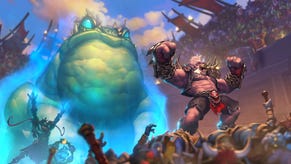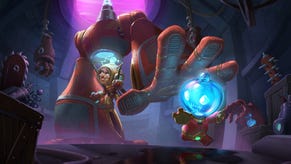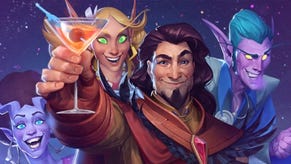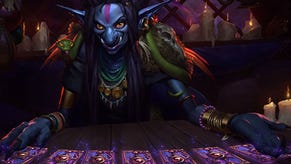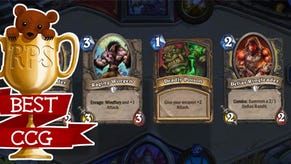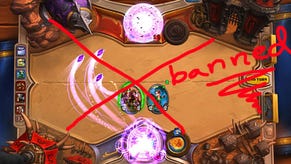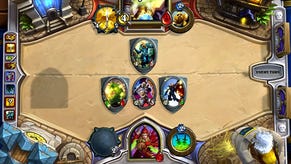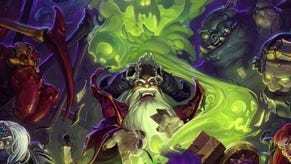Hearthstone: Heroes Of Warcraft Beta Impressions
Decked Out
First impressions: Hearthstone: Heroes Of Warcraft is an impressively crap name.
Fantasy games with terrible titles have a long and noble history, but Blizzard's Warcraft collectible card game boasts a particularly wonderful example. The classical NOUN COLON SOMETHING AND/OF SOMETHING structure is adhered to, but this is an almost gleefully bad noun. You have to go some to find a word they could have used that could be worse, without obviously taking the piss. I keep on checking it to see if my word-blindness has got it wrong, and it's HEARTSTONE or something, which while terrible, at least seems to be trying a little mythology. But no, it's hearthstone. A stone, in the hearth. I mean, I presume it's some very important part of Blizzard's reheating of Games Workshop's reheating of all the people who reheated Tolkien, but just because everyone in the world has played your previous game you can't assume that anyone in the world actually read any of the quest text.
I'm being so childish for a couple of reasons. Firstly, I'm bored and somewhat arsey. Secondly, if you're a hardcore Blizzardite, you don't give a fuck what I'm going to tell to you, as you're already aboard and it amuses me to pretend not to know what a hearthstone is. Thirdly, and most importantly, there's a large contingent of the RPS readership who are evidently deep in an anti-Blizzard phase, and I suspect that if I just went straight into saying what I wanted to say, you'll have your cynic-blinkers on and assume I've got a Murloc tattoo on my scrotum or something. By being a shithead, I buy a patina of credibility in your jaundiced eyes.

So, when I say this is one of the most beautiful little games I've played this year, it may actually sink in.
This really is a beautiful little game.
Hearthstone is a digital version of a collectable card-game, in the basic structure laid out in the 90s by Magic: The Gathering. You and your opponent play a dude, or a lady-dude in a crop-top (this is because magic comes out of your bellybutton when you're a lady, and if you cover your midriff you just burn a hole in your fancy garments). You draw “cards” from your “deck” of “cards” (The plural of “card”. We will henceforth use the layman's term for “card”, card). You get to play cards limited on resources, with some costing more and some costing less. The cards either directly whack the opponent, summon things to whack the opponent or (er) does something else. Eventually one player or the other is whacked so hard they have to sit down and cry. The (ahem) magical element is that the deck of cards you work through is designed by the player, from the ones you have available, giving the game a fascinating level of depth. The best games of the type are both about your abilities to design a deck that interacts in nifty ways and your ability during the game to make astute tactical choices upon the cards that turn up.

(Some of you may be wondering why I've just described the workings of a common game type that every true gamer knows about already. Hearthstone, to a lesser or greater degree, is aimed at people who don't already know about this stuff.)
Hearthstone is a brutally stripped down version of the deck-game type. While other card games have an economic system with a bunch of different energy types, Hearthstone goes for a single one: mana. While other games lean heavily into developing an economic output, Hearthstone keeps it to your mana reservoir increasing by one each turn. As every turn passes, each player will be able to throw larger and larger spells (or more smaller ones) from their hand. On the deckbuilding side, it chooses strict limitations – you're allowed to access the cards of your specific class (Paladin, Warrior, the fantasy box of chocolate assortment) and the neutral cards that are abstractly available to everyone.
In short, it focuses. There is no bloat. It knows exactly what it wants the game to be about, and what it doesn't.
And it motors.

If you listen to Quinns (and you should, as he's right), the current king of this sort of game (on the table, rather than the computer) is ANDROID: NETRUNNER. Netrunner is wonderful. It's an asymmetrical game of hacker-versus-corporation, which uses the cards in a way that is actively atmospheric. The problem with most of these sort of games is that the conflict is so abstracted from an event its meant to be about that it's never more than a pretty and geeky game of cards. The art on the cards is just flavour. This is just one set of numbers subtracting themselves from other sets of numbers. It simply bears no relation to the topic (heroes bashing the living hell out of one other) in the second-to-second play. NETRUNNER is different, because it's simulating something that is stylised and abstracted, and so the cards end up feeling like the map of a computer system. One player fundamentally constructs these servers and their defences, and the other chooses where to try and intrude – and how to do it. That alone would be enough, but doesn't even touch on the entirely separate joy of its oker-like aspect of bluff-and-counter-bluff that's right at the core of the game. Utterly startling. Can't recommend it highly enough.
There's one thing I don't like about Netrunner.
It takes between forty minutes and an hour to play a game. I've had games over an hour. It's not even that the game plays slowly, with maths dragging everything down. This is all thinking and hard decisions and fencing. It's great play for every second.

However, for a deck-building game, this is a flaw. When you design a deck, you have to play it to see if it works. And, due to the nature of a shuffle and random chance, you really need to play it several times. All this means that if I've got an idea for a Netrunner deck, I've pretty much got to put aside a whole evening to do even the most basic due diligence. As such, unless you're willing to give all your time into it, you're basically not getting even a fraction of what you should from the deck-building side.
By contrast, you'll burn through a game of Hearthstone in 10-20 minutes. Within an hour of conceiving a deck, you'll have a good idea of how it works. You'll be probably moving onto tweaking the thing. This is a genre of game that rewards that tinkering, and Hearthstone does everything it can to form this meaningful cycle of interaction. You learn a lot, and you learn quickly. You can try absolutely lunatic decks, just to see how they work, without sacrificing an evening of real play.

While I have nothing but love for and evening-length monster session, a game that gets the majority of what that a game of its type appealing and compresses it into a smaller space, is a thing to be cherished. A game you can have a quick game of – and have that play be meaningful is a great thing. And a great game that you can play a quick game of? Well, if you have those 2-3 hours, you can play 18-30 great games. That's good numbers.
Does it sacrifice depth? Possibly, but at this stage I wouldn't be willing to bet on it. I'm not even sure I care – what is gained from speed and precision become big ticks in the pro column. With the nine character classes, Hearthstone actually reminds me of 1-on-1 fighting games in its structure. There's even something about the attack/negate way combat tends to worth, though that's more of a reach. A lot of the game is about trying to make your opponent spend their resources less efficiently than yours. If you can kill a creature he summoned which cost 3 points with a monster that cost you 1 point, you're probably ahead.
Probably. Go with me.

It's in closed beta right now, but will be free-to-play, so when it goes public, you'll be able to give it a shot. You should. It's monetised primarily through the model of Magic: The Gathering. You can buy card packs, which expand the variety of ones you can pick from. Basic packs are six cards, at least one of which will be something a bit fancy (i.e. rarer and more exotic).
In the world of paper-games, I'm not particularly interested in this model. There's been a movement towards what's called LIVING CARD GAMES, where rather than having this randomised process, you actually just buy booster packs whose contents are entirely known. So rather than it being luck, you buy a pack and know what you'll add to your collections. In actual practice, it's not much cheaper if you want to stay up to date with the release of new cards, but it is cleaner. With Netrunner – one of the aforementioned Living Card Games – you know if you buy the packs as they come out, you'll be competitive with what everyone else is doing. I'll admit, I'd prefer that model. It's just fairer, and doesn't involve treating me like a five year old collecting football stickers. I like to know what I'm buying, and why.
That said, so far, I haven't been stomped by some Hearthstone ultra-card that I haven't seen yet. With Blizzard's (pretty damn good) matchmaking, I'll be interested to see how much of a problem this will be. I'd be hopeful that it means that people who want to be competitive buy cards and gravitate higher up the rankings, and those who are playing for shits and giggles end up being pushed against one another.

(Shame there's no card swapping too, obv, which is one of the major parts of collectible stuff in the real world, though there's obvious reasons why Blizzard have decided not to do this.)
Oh – as an aside, I've talked a lot about its accessibility in design, and it's worth stressing how that carries on throughout its design. You can only emote rather than text chat with random strangers, for which - in the year of DOTA2 - I can only express thanks. Unless they add a emote for telling me to die in a fire, in which case I frown.
The other main element of Hearthstone differing from a physical card game is the elements made possible via being computerised, such as the more random elements. Obviously, there's always the random element of the order the cards arrive from your deck, but this is more in the way some cards could operate. So, for example, there's a few cards which do an amount of damage to a random enemy. Or cards which summon a random creature from a small list. Or a card which is a tower of flame firing enormous damaging stuff everywhere. It's the sort of thing that would bog down real world game if you tried to simulate it with dice, but just about fits in here. I suspect whether it subtracts from the pleasure of the game is a matter of distinct taste. At least so far, I've been fine with the finger of fate.
The structure of hero-led design, while also keeping the deckbuilding in a confined space, also proves a useful device in terms of focusing on conceptual elements of the game. Each of the nine heroes, even with their starter decks, starts suggesting strong opening tactics to build upon – and, from that idea of what their unique strengths are, allows you to play against them. For example, I've been playing the Druid a bunch. Some of the most striking early possibilities of the Druid are the ability to up your mana production a little – there's one card which gives you an extra crystal, and another that is a one-shot of two extra mana. That's four cards that boost mana production significantly in a deck of thirty cards, with the ability to reject any of your starting cards if you like. Add to that a few things to help you churn through the deck, and a druid will have an early mana lead on the opposition.

Hell, if you're actively lucky, you could be dropping a six-point card on your first or second turn, which will pretty much make your opposition yelp. This is basic stuff for the druid, and your opponent will know that there's a chance you'll be trying to speed up your economic development, and trying to get in the way. Other characters are able to do that more easily than others. Take the Mage, whose speciality is big single-shot blasts that can kill pretty much anything (or, insult-to-injury-ing turn your massive ogre into a somewhat less threatening sheep). In that case, as a Druid, even if your mana cards are turning up, you can't help but suspect that if you bring one of your big guns out early, it'll get stomped by one of the fireballs lurking in her deck. In which case, maybe you'll try and get more of smaller cards out, trying to waste the mage's zaps. Once those two fireballs and two polymorphs are gone, you know a basic mage isn't going to be able to take out your demons and, etc, etc bloody etc.
You get that idea.
I use that fairly basic example just to show the sort of thought process going on with two interactions. That the character classes are defined enough to at least have a swift understanding of how they could play, you move swiftly into making smart choices rather than blundering around. You'll learn immediately that almost all creatures can only attack the turn after they're played. You'll get used to that rhythm, until someone breaks it. And then you learn quick. It only takes a Warrior to once pull a demon out of their back pocket, enhancing it with a charge (i.e. can attack the turn it's played) and letting it tear away half your health for you to realise “hey – I need to watch out for that stuff. I like that half of my health attached to my face.”

In short: it's well judged in how it both rewards, encourages and enables good play.
In terms of where the dynamic is less interesting... well, at least in the current low level play, there's a tendency for players to exhaust their hands and be reduced to simply drawing a single card per turn. That's the least satisfactory end to a battle, with victory often going to whoever turns up the nastiest monster in their deck first. That, for most characters, there's only limited options to burn through your deck means that if both players fight to a stand-still, that's how a match will end. However, that's low-level. Already you see players being a little more careful about spending their cards and trying to keep some in reserve. It'd be interesting to see there's anything anyone can do to mitigate it design side, or whether the solution will come from the players. These dull endings aren't the games I remember of Hearthstone, however. The ones that linger are where you're wrestling all the way, down to the last health-point, or ones where you Rumble-In-The-Jungle it, exhausting all your opponents cards, letting yourself collapse to your last few health points, and then come back with some ludicrously devastating late-game combo when they've nothing to stop it.
Good play is clean and beautiful. Bad luck is bad luck... but games are far more lost by bad play.
As well as play against human beings there's the option to practice against the (acceptable, but sub-human) AI, and giving them expert level decks to even it out a bit. There's also the Arena mode, which involves entering for a good chunk of in-game gold (i.e. probably out of game cash) and fighting it out with a bunch of random cards. Winner gets stuff back, basically. Stuff and things! Oh, I haven't played it.

In short, for all the fey fantasy trappings, this feels a lean, mean game – the sort of motorbike that's little more than the biggest engine you can attach to a couple of wheels, then pointed at the open road. Except that kind of ur-motorcycle designed with a world-class safety record to prevent you crashing. And...
Oh, this metaphor is bad as that name.
Hearthstone is in closed beta.


